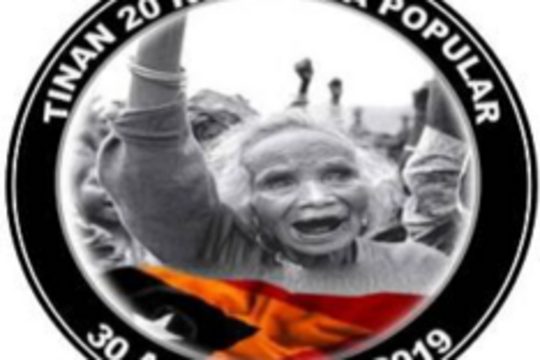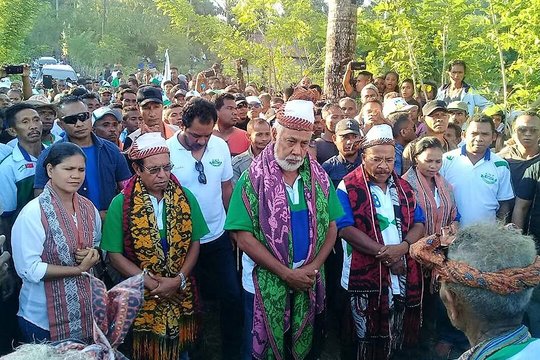

We support the people of Timor-Leste and raise public awareness in Germany. The process of building a stable democracy, dealing with the burdened past, the fight against gender-based violence and poverty, and social injustice are the challenges Timor-Leste faces today. An active civil society in the country has the strength to meet these challenges.
In solidarity with the people in Timor-Leste and in the advocacy for a global and righteous world, the Stiftung Asienhaus aims to position itself as a bridge builder.
We work in cooperation with East Timorese non-governmental organizations as well as faith based organizations and networks active on Timor-Leste.
Through our publications and events, we inform and increase awareness about about development policies and human rights issues in the country.
We invite civil society partners from Timor-Leste to Germany for political visits to strengthen our cooperation so that the interests of the partner can be adressed more directly.
With our expertise, we are getting involved in political talks: We lobby political actors on their work in development cooperation and point out shortcomings in those processes.
Get to know the program 'Focus Timor-Leste' and take a look at our flyer
Timor-Leste or Timor Lorosa´e like it is called in the national language Tetun, has reached independence after long, violent periods of colonial intervention and occupation. Since then, it paves its way forward to becoming a democratic state.
From 1975 to 1999, for 24 years, Indonesia illegitimately occupied the former Portuguese colony East Timor. The Indonesian military met the resistance of the East Timorese with a harsh regime of violence and terror. Despite of serious human rights violations, the conflict did not receive the necessary international attention. Only after the forced resignation of Dictator Suharto in May 1998, it was possible to find a more political and peaceful solution with the support of the United Nations. In 1999, the majority of East Timor's citizens voted for a separation from Indonesia. After that the local militia and the Indonesian military retaliated with a violent rampage, resulting in nearly 70% of the country getting destroyed and countless people driven out of their homes. Only the multinational peacekeeping force INTERFET was able to stop the destruction, the killing and the displacement of people. Until Timor-Lestes independence in 2002, the United Nations acted as an interim government in the country.
After centuries of foreign rule by Portugal and Indonesia, the country is now dealing with the task to consolidate their own identity as state and nation. Despite its oil and gas resources Timor-Leste is still among the least developed countries in the world. The situation is characterized by structural poverty, political instability and the persistent traumatic memories of the past.
Nevertheless, in the last couple of years the progress in Timor-Leste became increasingly visible. The mood is heightened and the air filled with optimism and change. This process of change is shaped by an active civil society that is successfully engaged in a large array of projects: Non-governmental organizations and religious institutions offer methods of peaceful conflict resolution and peace education. They work with the society towards a transformation of violent conduct and provide de-escalating youth and welfare work. They publicly condemn corruption and critically engage with the judicial system to uncover drawbacks in politics and economy. They confront sexual violence and are actively engaged in the promotion of women's rights and equality. The fostering and implementation of human rights, the rehabilitation of the burdened past and trauma management are their central goals.

20 years ago the people of Timor-Leste voted overwhelmingly to achieve independence. This event is looking to re-energizing the spirit of solidarity,…

“We should invest in success and not wait until the situation gets worse... We should invest in hope. That’s how I see Timor”, so die UNICEF…

All roads lead to Dili. The young population of Timor-Leste sees their future predominantly in the Capital of the country. The Berliku Fanu Rai Art…

The Institute of Asian Studies at the University of Bonn, the Stiftung Asienhaus and the Asienhaus student group sent out invitations to a lecture on…

Das Institut für Asienwissenschaften der Universität Bonn, die Stiftung Asienhaus und die Asienhaus Hochschulgruppe laden ein zum Vortrag mit…

Mit partizipativen Methoden hat die Asosiasaun Chega! ba ita (ACbit) zusammen mit der National Victims’ Association (NVA) und der…